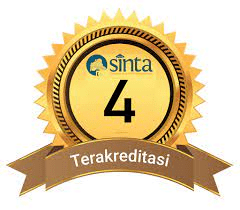The Health Sector Stock Market Reaction to the Implementation of the PSBB Policy Due to Covid-19 in Indonesia
Abstract
The pandemic that occurred at the end of 2019 resulted in changes in various sectors of life globally. Indonesia is one of the countries affected by this condition. After the government implemented the Large-Scale Social Restrictions (PSBB), this affected the stock market reaction, especially in the health sector. The research uses a quantitative approach with the type of event study research. This study uses descriptive statistical analysis. In order to test the normality of the data, it is necessary to test for normality using the Shapiro Wilk method. This is because the data used is less than 50. The researcher uses a hypothesis test t Test for data that is normally distributed, while for data that is not normally distributed, it can be tested with the Wilcoxon Signed Ranks Test. The results of this study indicate that before and during the implementation of PSBB, the abnormal return yields were insignificant, and there was no difference between the Average Abnormal Return before and during the implementation of PSBB in the health sector, but the Average Trading Volume Activity showed differences between before and during the implementation of PSBB. when the PSBB was implemented in the health sector. The conclusion is that before and when the PSBB was implemented, it showed that there was no significant difference in the Average Abnormal Return of the health sector, which means that the PSBB did not affect the Average Abnormal Return in the health sector but caused a significant difference in the Average Trading Volume Activity of the health sector, which means that the PSBB had an effect on the Average Trading Volume Activities (ATVA).
Keywords
Full Text:
PDFReferences
Adityara, E. (2012). Pengaruh Pasar Saham Dunia Terhadap Pasar Saham Indonesia. Etikonomi, 11(2), 108–125. https://doi.org/10.15408/etk.v11i2.1887
Al-Awadhi, A. M., Alsaifi, K., Al-Awadhi, A., & Alhammadi, S. (2020). Death and contagious infectious diseases: Impact of the COVID-19 virus on stock market returns. Journal of Behavioral and Experimental Finance, 27, 100326. https://doi.org/10.1016/j.jbef.2020.100326
Anakotta, F. M., & Lewaru, T. S. (2021). The Impact of Large – Scale Social Restrictions ( PSBB ) on The Stock Price of Service Companies on The Indonesia Stock Exchange. 12(1), 393–399.
Bei, D. I. (2009). Analisis Perbedaan Abnormal Return Sebelum Dan Sesudah Peristiwa Politik Pada Saham Perusahaan Lq-45.
He, P., Sun, Y., Zhang, Y., & Li, T. (2020). COVID–19’s Impact on Stock Prices Across Different Sectors—An Event Study Based on the Chinese Stock Market. Emerging Markets Finance and Trade, 56(10), 2198–2212. https://doi.org/10.1080/1540496X.2020.1785865
Hidayat, R. (2018). Analisis Perbedaan Abnormal Return Sebelum dan Sesudah Peristiwa Politik pada Saham Perusahaan LQ-45 di BEI. Jurnal Ilmu Manajemen, 7 (2), 193–204.
Hindayani, N. (2020). Analisis Reaksi Pasar Saham Atas Peristiwa Covid-19 Di Indonesia. Jurnal Ilmiah MEA (Manajemen, Ekonomi, & Akuntansi), 4(3), 1645–1661. http://journal.stiemb.ac.id/index.php/mea/article/view/647
Kusdarmawan, P. A., & Abundanti, N. (2018). Analisis Abnormal Return Saham Sebelum Dan Sesudah Reverse Stock Split Pada Perusahaan Di Bei Periode 2011-2015. E-Jurnal Manajemen Universitas Udayana, 7(7), 3827. https://doi.org/10.24843/EJMUNUD.2018.v07.i07.p14
Liew, V. K. S. (2020). Abnormal Returns on Tourism Shares in the Chinese Stock Exchanges amid COVID 19 Pandemic. International Journal of Economics and Management, 14 (2), 247–262.
Mailangkay, F., Mangantar, M., & Tulung, J. (2021). Reaksi Pasar Modal Terhadap Penerapan Kebijakan PSBB Pada Industri Perhotelan Yang Terdaftar Di Bursa Efek Indonesia. Jurnal EMBA, 9(3), 640–647.
Mauludi, A. (2017). STATISTIK 1. Alim’s Publishing. Jakarta Timur
Nasehudin dan Nanang Gozali. (2012). Metode Penelitian Kuantitatif. Pustaka Setia. Bandung
Novianggie, V., & Asandimitra, N. (2019). The Influence of Behavioral Bias, Cognitive Bias, and Emotional Bias on Investment Decision for College Students with Financial Literacy as the Moderating Variable, International Journal of Academic Research in Accounting. International Journal of Academic Research in Accounting, Finance and Management Sciences, June, 92–107. https://doi.org/10.6007/IJARAFMS/v9-i2/6044
Pramono, Y. W. (2007). Analisis Abnormal Return Saham Dan Volume Perdagangan Saham Harian Sebelum Dan. In Repository Universitas Sanata Dharma.
Rori, A., Mangantar, M., & Maramis, J. B. (2021). Reaksi Pasar Modal Terhadap Pengumuman Pembatasan Sosial Berskala Besar (Psbb) Akibat Covid-19 Pada Industri Telekomunikasi Di BEI. Jurnal EMBA: Jurnal Riset Ekonomi, Manajemen, Bisnis Dan Akuntansi, 9(1), 851–858. https://doi.org/10.35794/emba.v9i1.32620
Sujana, I. N. (2017). Pasar Modal yang Efisien. Ekuitas: Jurnal Pendidikan Ekonomi, 5(2), 33–40. https://doi.org/10.23887/ekuitas.v5i2.12753
Supardi, S. (1993). Populasi dan Sampel Penelitian. Unisia, 13(17), 100–108. https://doi.org/10.20885/unisia.vol13.iss17.art13
Article Metrics
Abstract has been read : 348 timesPDF file viewed/downloaded: 0 times
DOI: http://doi.org/10.25273/inventory.v6i1.12048
Refbacks
- There are currently no refbacks.
Copyright (c) 2022 Intan Fadila Rahma, Dyah Pravitasari

This work is licensed under a Creative Commons Attribution-ShareAlike 4.0 International License.
Indexed by:
Supported by:
Editorial Office:
Universitas PGRI Madiun
Kampus 3 Lantai 2 Program Studi Akuntansi
Fakultas Ekonomi dan Bisnis
Jl. Auri no. 14-16 Madiun








